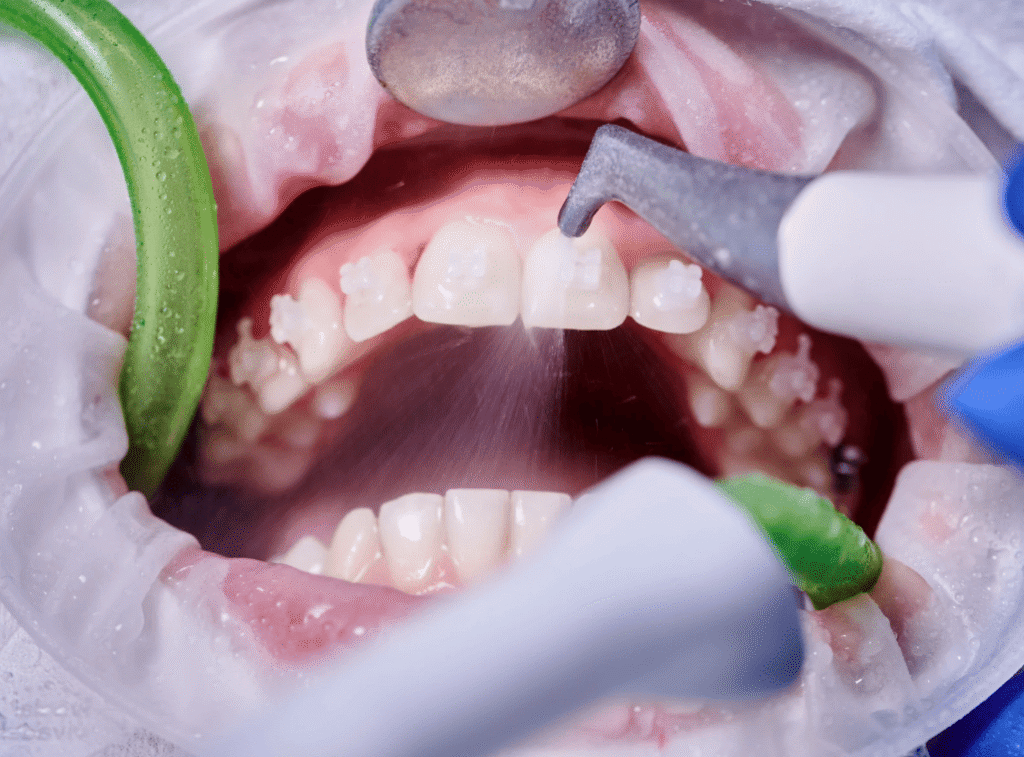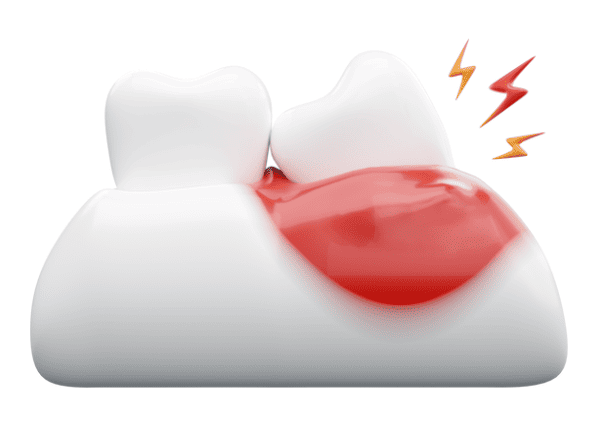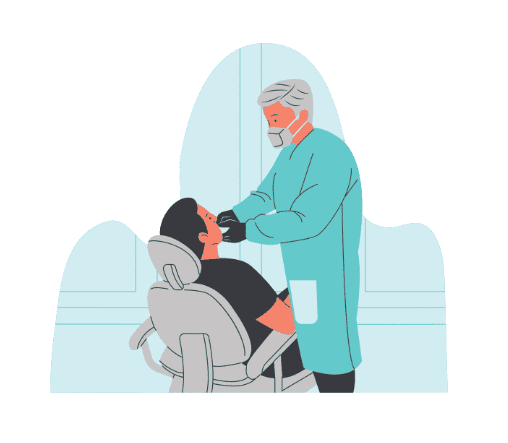



Gum swelling and pain refer to the inflammation, swelling, or pain of the gums, often accompanied by redness, heat, and bleeding. This condition may be an early sign of certain oral diseases or just a temporary inflammation. Regardless of the cause, gum swelling and pain require attention, and finding the right solution promptly is essential.
Periodontal disease and gingivitis are among the leading causes of gum swelling and pain. When the gums are infected by bacteria, symptoms such as swelling, bleeding, and pain may arise. If plaque is not thoroughly cleaned over time, bacteria can gradually erode the gums, leading to increased inflammation and potentially resulting in tooth mobility and damage to the supporting tissues.
*Regular dental cleanings can effectively prevent periodontal disease and maintain oral health.
The growth of wisdom teeth is a common reason for gum swelling and pain. Wisdom teeth typically emerge during adolescence or adulthood, located at the back of the mouth. Due to limited space, wisdom teeth may grow sideways or partially erupt, causing gum inflammation, swelling, and pain. In such cases, gum swelling and pain are usually concentrated around the last molar, leading to swelling in the back gum area.
*If wisdom teeth are causing persistent gum pain, it is advisable to seek a professional examination promptly.
Brushing too hard or using incorrect flossing techniques may also damage the gums, leading to inflammation and pain. In these cases, gum swelling and pain typically occur at the injury site and may be accompanied by slight bleeding. To avoid such situations, it is advisable to use a soft-bristled toothbrush and adopt gentle cleaning methods.
Some women get swollen and sore gums, which may bleed, during pregnancy. Bleeding gums are caused by a build-up of plaque on the teeth.
Hormonal changes during pregnancy can make your gums more vulnerable to plaque, leading to inflammation and bleeding. This is also called pregnancy gingivitis or gum disease.
Some unhealthy lifestyle habits may also contribute to gum swelling and pain, such as smoking, picking the tooth with tooth picks, excessive sugar intake, and a diet high in unhealthy fats. These factors can accelerate bacterial growth, leading to gum problems.


Rinsing with salt water is a natural anti-inflammatory method that helps inhibit bacterial growth and reduce gum swelling. It is recommended to use a teaspoon of salt in warm water to rinse two to three times a day, especially suitable for mild gum infections or swelling. Please consult a doctor before doing this, if you have high blood pressure issues.
Both cold and warm compresses can effectively alleviate symptoms of gum swelling and pain. Applying an ice pack or cold towel to the affected area for 10 to 15 minutes can reduce inflammation and swelling; alternatively, a warm towel can be placed on the jaw to promote blood circulation and relieve pain.
Taking anti-inflammatory and pain relief medication under appropriate guidance can effectively alleviate gum swelling and pain. Common over-the-counter medications like ibuprofen or aspirin have anti-inflammatory and pain-relieving properties. However, it is advisable to consult a professional before using any medication to ensure safety.
To avoid aggravating gum swelling and pain, it is advisable to avoid spicy, fatty, and sugary foods. Increasing your intake of vitamin C-rich fruits and vegetables, such as oranges, kiwis, and carrots, can help enhance gum health. Additionally, sufficient hydration helps maintain moisture in the mouth and reduce bacterial growth.


While at-home care can effectively relieve some gum swelling and pain, there are situations where immediate professional dental assistance is necessary.
If the pain persists and worsens, this typically signals a dental health issue that may require a dentist to conduct a thorough examination and treatment to prevent more severe oral health problems.
If gum swelling and pain are accompanied by fever, severe swelling, or other symptoms, it may indicate that the infection has spread to other areas. In this case, immediate dental consultation is necessary to prevent impacting overall health.
If your gums are repeatedly swollen and painful, and you have tried various at-home care methods without success, this may indicate an underlying problem in the oral cavity, such as periodontal disease or other tooth infections. A dentist can use X-rays or other examination methods to identify the root of the issue.
Preventing gum swelling and pain hinges on good oral care habits. Here are some simple preventative measures:
Maintaining oral hygiene is fundamental in preventing gum swelling and pain. It is recommended to use a soft-bristled toothbrush and brush your teeth gently for at least two minutes each time. Additionally, using dental floss to clean between your teeth effectively prevents plaque buildup and reduces the risk of gum inflammation.
A balanced diet is crucial for maintaining oral health. It is advisable to consume foods rich in vitamins and minerals while avoiding excessive sugar and fatty foods to reduce plaque and tartar formation, thereby decreasing the risk of gum problems.
Regular dental check-ups, ideally every six months, can help identify and address gum health issues early. This not only aids in the timely detection of gum problems but also helps prevent severe gum diseases, maintaining a healthy oral environment.
Smoking and excessive alcohol consumption are harmful to gum health. Harmful substances in tobacco can impair the mouth’s self-repair abilities, increasing the risk of periodontal disease; excessive alcohol can irritate the gums, leading to inflammation and swelling.
While gum swelling and pain are common, they should never be ignored. Whether caused by wisdom teeth, periodontal disease, or lifestyle habits, timely intervention and appropriate at-home care can help relieve discomfort and effectively prevent recurrence. Moreover, regular check-ups and professional dental care are key to maintaining gum health. By mastering proper care techniques and cultivating good oral hygiene habits, you can significantly reduce the occurrence of gum swelling and pain, ensuring the health of your teeth and gums.
Gum swelling and pain may resolve on their own, especially if mild, but if the pain persists or worsens, it is essential to seek professional dental treatment to prevent further health issues.
You can use saltwater rinses, cold and warm compresses, or take appropriate pain relief medication. Additionally, maintaining a balanced diet, increasing water intake, and avoiding irritating foods can help alleviate gum swelling and pain.
It is advisable to consume vitamin C-rich fruits such as oranges and kiwis, as well as foods high in antioxidants like green tea and carrots. These foods can help strengthen gum immunity and reduce inflammation.
Mild gum inflammation can be treated with saltwater rinses or antibacterial mouthwash, combined with cold and warm compresses. If gum inflammation is severe, it is advisable to use appropriate anti-inflammatory medication under a dentist’s guidance.
Disclaimer
This article is for informational purposes only and does not constitute professional dental advice. If you require dental treatment or related information, we recommend consulting a professional dentist registered with the Dental Council of Hong Kong to obtain advice and diagnosis tailored to your individual needs.
While we strive to provide accurate and reliable information, we do not guarantee the completeness or timeliness of the content. The information provided should not be considered a substitute for professional dental advice, diagnosis, or treatment. If you have any concerns, please consult your dentist or other qualified healthcare professional and follow their recommendations.


Experiencing gum swelling or discomfort? Don’t wait—book an appointment for a professional gum health check. Our expert team is here for emergency and routine care to keep your smile healthy. Call or WhatsApp us today!